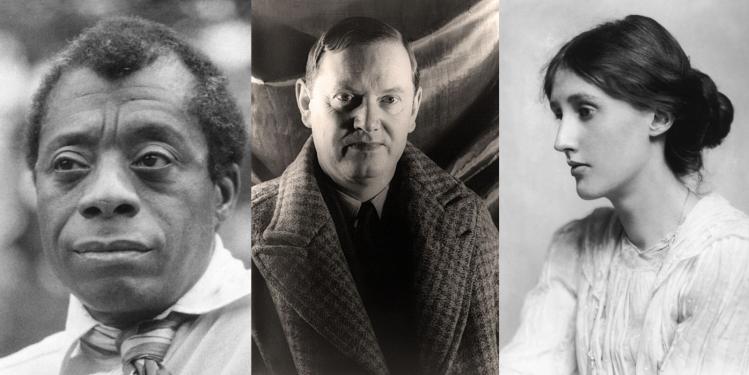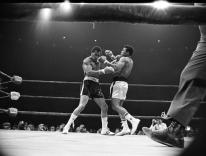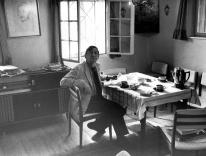
William Giraldi is the author of the novels Busy Monsters and Hold the Dark, and of a memoir, The Hero’s Body. In August Liveright published a collection of his literary criticism titled American Audacity, which the novelist and critic Walter Kirn describes as “a gorgeous fury of language and sensibility.” In an interview conducted by email, Giraldi and Commonweal’s book columnist Anthony Domestico recently discussed the practice of criticism and how it relates to other kinds of writing.
Anthony Domestico: In your introduction, you write, “The critic is a reader before he is a writer, a spirited lover of literature, and criticism is one important use to which he puts his reading and his love.” I think that’s exactly right: the best critics are the best readers and the best readers are, I’m increasingly convinced, the most loving readers.
All this reminds me of a passage from Virginia Woolf’s “How Should One Read a Book?”: “Perhaps the quickest way to understand the elements of what a novelist is doing is not to read, but to write; to make your own experiment with the dangers and difficulties of words.” What do you make of Woolf’s suggestion here that criticism is a fundamentally creative act? What about her claim that good reading begins in sympathy, even charity; that, before judging, we should “try to sink our identity as we read”?
William Giraldi: Woolf is correct, of course—she usually is—and her contention there is in keeping with what Arnold and Wilde advocate both in theory and practice: that the critic must seek equal footing with the primary creator; that criticism makes imaginative literature possible by providing an essential reciprocity. In our own day, we see that reciprocity, that Wildean exuberance of critical assertion, most potently at work in the criticism of Harold Bloom and Cynthia Ozick—Ozick especially. No other living critic, and few living fiction writers, can wield an English sentence as Ozick can.
When Woolf suggests that we should attempt to “sink our identity” while reading, she means, I take it, what Arnold means by “disinterestedness”: not being uninterested, but being objective and detached enough to take the book by its own program, not to let our own savagely guarded identities or political affiliations or religious convictions sully our assessment of how the sentences and stories are or are not working on the page. By sympathy and charity I think Woolf means just that—the charity to set our own identities aside so that we may fully enter the selfhood of the author or characters under review. This is akin to that famous quip Eliot makes in “Tradition and the Individual Talent” about poetry being an escape from personality. I’d say that criticism must make an identical escape. I don’t mean that critics shouldn’t cultivate a personal style, a particular potency of mind, only that their personalities, their me-tinted glasses, should not discolor what lies before them on the page.
About the necessity of critics being readers before they are writers, I’d argue the same about any writer in any genre. There are quite simply no idiot savants in literature as there are in math, music, painting. Without a life as a devoted reader of serious books one can never hope to become a serious writer. And by “serious” I mean what Gerard Manley Hopkins means for the writer: to be “in earnest,” to employ “justice and candor and gravity and rightness of mind,” which is how he praises the work of Cardinal Newman. Or as he puts it elsewhere: the “touchstone of the highest or most living art is seriousness...being in earnest with your subject.”
AD: People love to quote Eliot on poetry as an escape from personality. They don’t usually quote what comes immediately after: “But, of course, only those who have personality and emotions know what it means to want to escape from these things.” Great critics, like great poets, have a distinctive style, but it’s a distinctive style that doesn’t distort what it encounters. One of the things I admire most about Ozick, and about you, is precisely the seriousness you mention—as you put it when describing Ozick’s criticism, “the wedding of the cerebral and visceral in pursuit of moral verity.” That word, “moral,” comes up at several points in your collection. In an essay on James Baldwin, for instance, you write that, at least in the best writers, “style is the assertion of morality.” For you, art stripped of moral concerns isn’t really art, and it’s the job of the critic to discern how these concerns play out not so much at the level of theme, but at the level of style—in images, sentences, rhythms. I’m reminded of one of my favorite passages from Auden:
Speaking for myself, the questions which interest me most when reading a poem are two. The first is technical: “Here is a verbal contraption. How does it work?” The second is, in the broadest sense, moral: “What kind of a guy inhabits this poem? What is his notion of the good life or the good place? His notion of the Evil One? What does he conceal from the reader? What does he conceal even from himself?”
Ideally, the critic integrates these two concerns, the stylistic and the moral. Do you find that contemporary criticism does one better than the other? Is the training or reading required to be a good critic of style different from the training required to be a good moral critic?
WG: When I suggest a nexus between style and morality I mean always to keep the query centered on the book, to interrogate the book’s moral vision as it is activated in language. That vision, like everything else in the writer’s arsenal, is manifest in style. Language is our fullest, most accurate embodiment of mind. How you write is how you think, and there’s reciprocity there, a fertile feedback loop, because the writing in turn sharpens the thinking, which in turn sharpens the writing. This is what Goethe means by “a writer’s style is a true reflection of his inner life.” Remember, too, Nabokov’s oft-cited line: “Style is matter.” He means that style is not something gummed onto prose after the fact—style is the fact. Style is born of subject. Robert Penn Warren makes a similar observation: “The style of a writer represents his stance toward experience.” That’s what Auden means in his second consideration above.
Perhaps an effective way to see the connection between style and morality is to look at an extreme example: propaganda. Here we have deliberately reductive, often fanatical writing designed to hoodwink you by appealing to your need for simplicity, explanation, accusation. Propaganda is always poor writing because it is, by definition, immoral in its motives, and reductive, histrionic, and stereotypical in its expressions. It’s the meeting place of jargon and dogma. In those lines by Auden, it looks as if he is suggesting that style and morality are separate considerations, but I don’t think he is, because his first concern, the technical, is in reciprocity with his second concern, the ethical. In imaginative literature, the technical cannot be disentangled from the ethical. That’s a lesson my teacher Geoffrey Hill, in our studies of Hopkins, made sure I did not miss. When Chesterton says, “It is difficult to believe that people who are obviously careless about language can really be very careful about anything else,” he too underlines the necessity of a moral vision for any work of imaginative literature.
Many contemporary critics are writing beautiful criticism in a mode that comprehends that effective criticism cannot be merely psychological, biographical, or plot-centric, but among living critics Ozick remains my hero and my standard. I’m continually astonished by her abilities. What I didn’t recognize about American Audacity, though, not until after it was in galleys, is how much James Baldwin is a guiding potency throughout that book. I mean Baldwin’s emphasis on the soul, on the state of our souls as individuals and the state of our soul as a nation. He also advocates for aesthetic splendor; he has no patience for any book shoddily built, no matter the worthiness of its message. His brand of aesthetic criticism restores literature to what Harold Bloom calls its original autonomy, “the sovereignty of the solitary soul.”
AD: I noticed the centrality of Baldwin, too. At one point, you note that Baldwin “wields a fierce critical acuity and is punishing to a degree we today are much too delicate to endure.” What do you think has brought about this delicacy, and what have we lost when critics refuse to write fiercely negative, fiercely intelligent criticism? I’m thinking in particular of Stephanie Burt’s defense of positive criticism: “There’s so little airtime available for any poetry these days that when I get space and time in which I can do whatever I want, I don’t want to say, ‘X sucks.’ I almost always prefer to say, ‘Please check out Y,’ or ‘Z isn’t what you think,’ or ‘Look at what A, B and C have in common.’”
WG: I understand that position, and I sympathize with it, too, though I’d say that bad poetry shouldn’t be falsely praised just because all poetry has a fragile status in our culture. She’s not saying that, of course; she’s saying that her choice is to ignore the bad stuff and laud the good stuff. I discover myself following a similar program as I age, mostly because I’m no longer self-punishing enough, no longer have the stamina or patience, to suffer through a lobotomized novel, anemic memoir, or palsied story collection, and then whip up three thousand words on how and why it fails in its armature and language. Now, when a book I’ve been assigned is unbearably deficient, I often tell my editor I can’t do the review, please assign me another. I’d much rather praise than pillory, and most of the essays in American Audacity are love songs to those writers, living and dead, who have meant the most to me. But there’s got to be multiplicity of judgment. If critics only praise, if they celebrate every book that lands in their laps, we very quickly run into a trust problem: How are we to know when their praise is genuine and when it is mere pandering? That’s the chief answer to your question about what we lose when all book comment is unjustly celebratory: we lose trust.
Near the middle of the last century, Cyril Connolly lamented “the sycophantic torpor of reviewers,” and we see a similar torpor today. But before we pivot to that, I want first to point out that Connolly’s age, like the late British nineteenth century, saw some eviscerating book criticism. Let me quote this savage bit by Evelyn Waugh on Stephen Spender:
At his christening the fairy godparents showered on Mr. Spender all the fashionable neuroses but they quite forgot the gift of literary skill. At one stage of his life Mr. Spender took to painting and, he naively tells us, then learned the great lesson that “it is possible entirely to lack talent in an art where one believes oneself to have creative feeling.” It is odd that this never occurred to him while he was writing, for to see him fumbling with our rich and delicate language is to experience all the horror of seeing a Sèvres vase in the hands of a chimpanzee.
Amazing, right? Waugh was a Tory Catholic who found Spender’s bohemian homosexuality repellent, so you can taste the personal acrimony in those lines, which of course is not aboveboard. But the other thing to remember is that Waugh was one of the best-read writers of his age, and that reading allotted him a supreme confidence in his own abilities and assessments. He’s being performative in that review, showcasing the depth of his literacy and the earned ferocity of his decisiveness, but he’s also measuring Spender against “the best that is known and thought in the world,” as Arnold has it: he’s measuring Spender against the vibrant complexities of the canon, employing what Arnold calls an “inflexible honesty, with due ability.” You see the same inflexible honesty and due ability in the best American criticism of the last century, from Edmund Wilson and Lionel Trilling to Elizabeth Hardwick and Mary McCarthy to James Baldwin and Susan Sontag, and you can see it today in our best critics, from Cynthia Ozick and Harold Bloom to Adam Kirsch and Katie Roiphe. And there’s strong American precedent there: just look at how Poe dismantled Longfellow or how Twain ravaged Fenimore Cooper.
Your question about what has brought on our new delicacy and dearth of fierce intelligence is not altogether easy to answer, but much of it, I suspect, has to do with a modish disregard for the canon, for the best of what has been written across the centuries. Too many newspaper critics and online yelpers approach books with what appears a despairing lack of immersion in great literature. They have opinions all right, but there’s no firmness of judgment, no confident method or manner of asserting how a book succeeds or fails, so best to be vaguely positive, just call it “brilliant” and “fascinating,” the blurbist’s two pet clichés. Discernment is dead. One thing is as good as any other now.
Another factor in play, perhaps, is the mutual-support ethos of many MFA programs and writers’ conferences, some of them bastions of manufactured equivalence, from which most writers today have emerged. But we also can’t overlook the internet’s role in all of this. As you know, social media is a pageant of animus, one gout of grievance after another, sorties of impotent wrath. Baldwin calls this species of bile “unrewarding rage.” Perhaps some critics and reviewers are weary from exposure to all that unrewarding rage, and so their antidote is positivity at all costs.
What I want to emphasize, though, and what I tried to demonstrate throughout American Audacity, is the importance of literary love for the critic. Critics are devoted readers whose selfhoods have been revamped by literature, and criticism is not only their homage to the spirit of great books but a paying of their debt to those books. Beauty, pleasure, wisdom: those are the necessary ingredients both to literature and to the criticism that aims to assess it.
Please email comments to [email protected] and join the conversation on our Facebook page.
Share
Previous Story
A Visit to a Roman ‘Field Hospital’
Next Story
Take These Jobs and Shove ’Em


